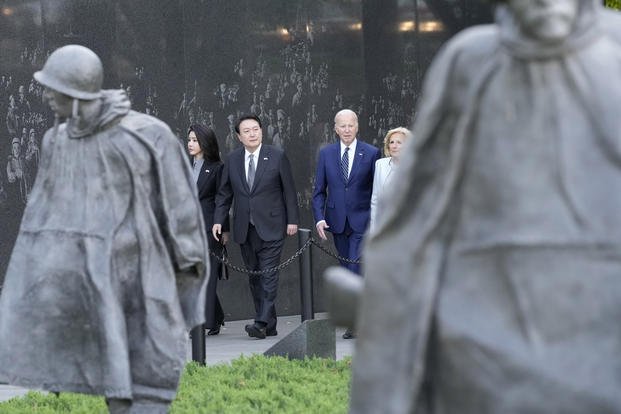WASHINGTON — The remains of a U.S. Army corporal killed during the Korean War have been identified 73 years after he was declared missing and was awarded the Medal of Honor for bravery, U.S. and South Korean officials said Wednesday.
Luther H. Story of Buena Vista, Georgia, was posthumously awarded the nation’s highest military award for his actions during an intense attack by the North Korean army on Sept. 1, 1950.
U.S. officials said that Story “fearlessly stood in the middle of the road, throwing grenades into the truck. Out of grenades, he crawled to his squad, gathered up additional grenades, and again attacked the vehicle.”
He was wounded in action and stayed behind so that his company could get to safety.
“When last seen he was firing every weapon available and fighting off another hostile assault,” U.S. officials said.
Story’s remains could not be identified, and Gen. Omar Bradley presented Story’s father the Medal of Honor at a Pentagon ceremony in 1951. The corporal was declared unrecoverable — his remains still missing — on Jan. 16, 1954.
In June 2021, 652 people killed in the Korean War were disinterred and using, DNA, dental and anthropological analysis on the human remains, discovered Story’s remains.
“The supreme sacrifice and heroism of Corporal Luther Story is illustrative of the freedom, security, and prosperity the South Korean people have today,” the White House and Republic of Korea said in a joint statement.
The announcement comes as President Joe Biden welcomed South Korean President Yoon Suk Yeol for a state visit. On Tuesday evening, Yoon and his wife, Kim Keon Hee, made an evening stop to the Korean War Memorial with Biden and first lady Jill Biden. They participated in a wreath-laying ceremony next to the memorial’s Pool of Remembrance. While they were there, the leaders met with Story’s living relative, his niece Judy Wade and her spouse Joseph Wade.
Both nations continue to work to identify all missing soldiers.
Show Full Article
© Copyright 2023 Associated Press. All rights reserved. This material may not be published, broadcast, rewritten or redistributed.
Read the full article here





